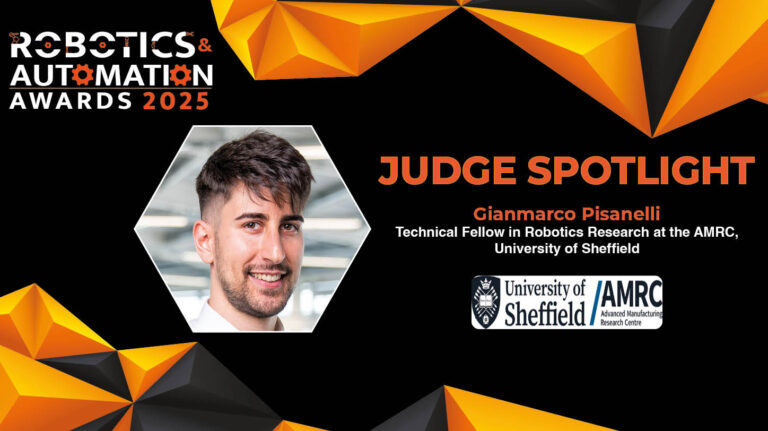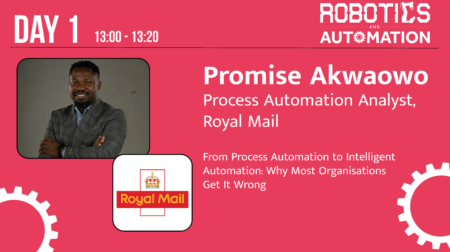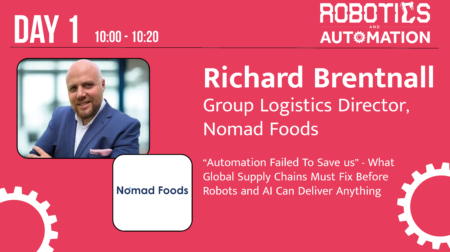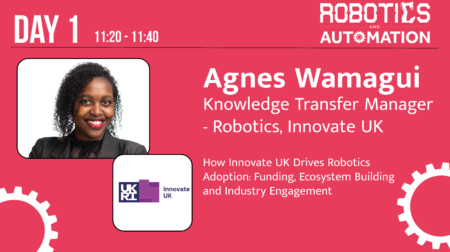With entries for Robotics & Automation Awards 2025 now open, Robotics & Automation Magazine has launched an exclusive series of Q&A interviews with the expert panel of judges responsible for evaluating this year’s submissions.
Over the coming weeks and months, the magazine will spotlight each judge – a dynamic mix of thought leaders, technical specialists, and business strategists drawn from across the robotics, automation, AI and smart manufacturing sectors – to explore their backgrounds, industry outlooks and what they’ll be looking for in an award-winning entry.
From end users and integrators to researchers and investors, this year’s panel represents a diverse blend of practical and academic expertise – all of which will help identify the most transformative, scalable, and commercially viable innovations driving the next era of automation and intelligent systems.
Our next judge is Gianmarco Pisanelli, a technical fellow in robotics research at the AMRC, specialising in early-stage TRL research focused on collaborative workspaces, multi-robot systems, and robotic simulations.
He has extensive expertise in ROS, AGVs, AI-driven robot control, and digital twins, with hands-on experience in industrial robotics and programming. As the AMRC’s lead developer for ROS, he represents the organisation at the ROS-Industrial Consortium Europe.
Recognised with the 2021 UK-RAS Community Award, Gianmarco was elected to the UK RAS Network Executive Board in 2024, furthering his contributions to robotics innovation and collaboration. He is also co-Theme Lead of Sheffield Robotics Executive Board.
Name: Gianmarco Pisanelli
Job title: Technical Fellow in Robotics
Organisation: AMRC, University of Sheffield
How does your professional background align with the Robotics & Automation Awards’ goal of recognising excellence in automation and intelligent technologies?
As Technical Fellow in Robotics Research at the AMRC, I’ve spent my career at the intersection of intelligent automation, manufacturing, and human-robot collaboration. Over the years, I’ve worked across various sectors implementing intelligent automation solutions, assessing emerging technologies, and evaluating their impact on productivity and innovation. This perspective allows me to appreciate both the technical complexity and the broader business value of automation initiatives, aligning closely with the Awards’ mission to spotlight excellence and ingenuity in this field.
In my role on the Executive Board of the UK Robotics and Autonomous Systems Network, and as co-theme lead for Manufacturing at Sheffield Robotics, I’m constantly immersed in early-stage research, technologies that are still raw, experimental, and full of potential. It’s a privilege to be exposed to that front end of the innovation pipeline, where I get to discover not only whether something works, but also whether it matters, whether it could have real impact in the years ahead. That perspective helps me spot breakthroughs early and understand how today’s lab experiments might become tomorrow’s industry game-changers.
What current trends or technologies in robotics and automation are you most excited about, and how do you anticipate seeing them reflected in this year’s entries?
What drew me to robotics in the first place is how incredibly varied the field is, so I’m really going to struggle to give a short answer to this, but I shall try my best.
Firstly, AI, particularly foundation and generative models, has shaped nearly every conversation in tech over the past three years, but it still seems to struggle to break into the world of robotics. We still don’t have a “RobotGPT,” as someone has called it: a system that empowers robots to use natural language for rational interaction, especially in areas like adaptive manufacturing and human-robot collaboration; and it’s certainly not for lack of trying. I’m hoping that some of the entries will show breakthroughs in this space, giving automation systems the ability to operate in less structured environments.
I would also love to see entries that cover edge computing in robotics, sustainability-driven automation, and low-code development platforms. The latter are particularly important for democratising the use of robotics, which are still so complex that only a small number of people can program them.
I’m also very interested in how robotics and automation are being used to improve human lives. Too often, we still see human workers having to wait, reroute, or change their routines just to avoid interrupting or confusing the robots. I want to see systems that are designed with people at the centre; robots that take on tasks that are dull, dirty, or dangerous; that support wellbeing and productivity; and that integrate smoothly into existing workflows without creating new burdens. Designing with empathy and utility in mind will be key to making robotics truly transformative.
From your perspective as a judge, what qualities will distinguish a truly standout submission?
In a word: uniqueness. Too often, we see incremental improvements on existing solutions. Yet another robot performing a task that others already do in a similar way, or a new robot with a slightly higher payload. What I’m looking for is something that stops me in my tracks, something I haven’t seen before or perhaps didn’t even think was possible. Of course, technical execution and measurable impact matter, but originality is what will make an entry unforgettable.
How do industry awards such as these help foster innovation, investment and commercialisation in the robotics and automation sector?
Industry awards offer vital recognition, something that can be incredibly motivating for teams and individuals. Winning or even being shortlisted validates that their work is making a difference. It helps them realise they’re on the right path, especially in fields like robotics and automation where breakthroughs can take years of effort.
That recognition boosts confidence, encourages risk-taking, and often leads to renewed support from stakeholders, funders, and collaborators. It can also serve as inspiration for others who might just need a small push to get started.
Finally, events like this provide valuable exposure to great technologies that might otherwise remain under the radar. Contrary to popular belief, due to the few familiar faces in Silicon Valley that are constantly pushed in front of us, some of the best robotics and automation engineers shy away from shouting about their achievements. In those cases, being recognised through awards can be one of the few ways their work gets noticed by potential investors.
Can you share an example of a robotics or automation innovation – either recent or historic – that you believe has had a lasting impact on the way industries operate?
Industrial serial manipulators have been true game changers. Their introduction revolutionised the assembly line, offering flexibility, repeatability, and endurance far beyond human capabilities. A testament to their impact is their enduring design. The core kinematic architecture of the first industrial robot, Unimate, introduced in the 1960s, remains largely unchanged today.
From a software standpoint, I often draw a parallel with the introduction of the Microsoft operating system, which democratised computing. From unintuitive and cumbersome machines, computers became accessible, affordable, and user-friendly for the general public leading to the mass adoption of personal computers. In robotics, I believe we’re still waiting for that kind of democratising leap. Robots today still require expert knowledge to program, configure, and integrate. ROS (2) proposes itself as the solution but the road is still long and full of challenges.
What advice would you give to companies and individuals submitting an entry this year?
Don’t just present a finished product, tell the story behind it. We want to see the passion, the journey, and the people behind the innovation. What inspired the idea? What challenges did you overcome? How did your thinking evolve? These human elements are just as compelling as the technical achievements.
Achievements and innovations in retail and e-commerce, healthcare and pharmaceuticals, food and beverage, automotive, transport & logistics, and more will be celebrated at the Robotics & Automation Awards on 29 October 2025 at De Vere Grand Connaught Rooms in London. Visit www.roboticsandautomationawards.co.uk to learn more about this unmissable event for the UK’s robotics and automation sectors!









